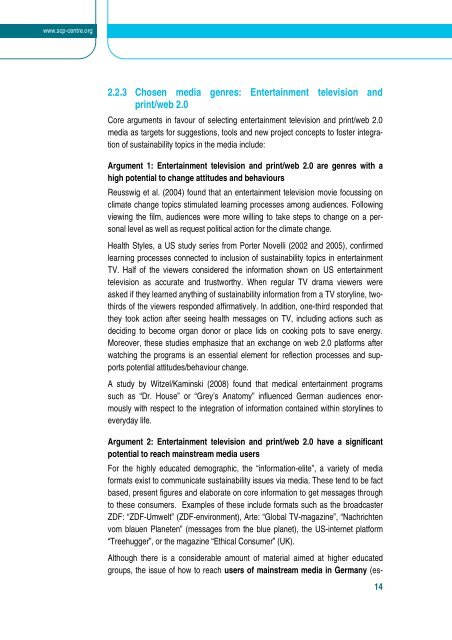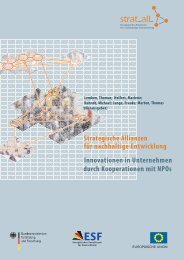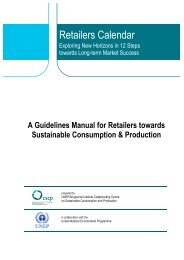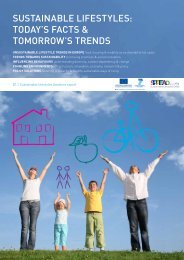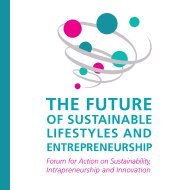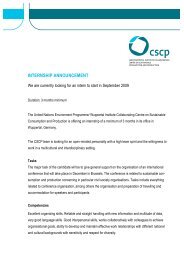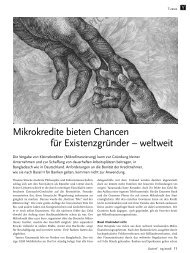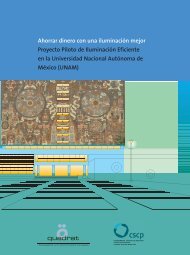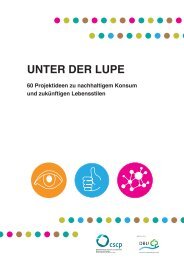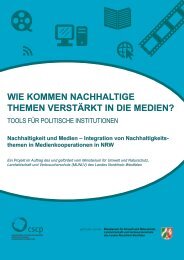integrating sustainability themes into media - Collaborating Centre ...
integrating sustainability themes into media - Collaborating Centre ...
integrating sustainability themes into media - Collaborating Centre ...
You also want an ePaper? Increase the reach of your titles
YUMPU automatically turns print PDFs into web optimized ePapers that Google loves.
www.scp-centre.org<br />
2.2.3 Chosen <strong>media</strong> genres: Entertainment television and<br />
print/web 2.0<br />
Core arguments in favour of selecting entertainment television and print/web 2.0<br />
<strong>media</strong> as targets for suggestions, tools and new project concepts to foster integration<br />
of <strong>sustainability</strong> topics in the <strong>media</strong> include:<br />
Argument 1: Entertainment television and print/web 2.0 are genres with a<br />
high potential to change attitudes and behaviours<br />
Reusswig et al. (2004) found that an entertainment television movie focussing on<br />
climate change topics stimulated learning processes among audiences. Following<br />
viewing the film, audiences were more willing to take steps to change on a personal<br />
level as well as request political action for the climate change.<br />
Health Styles, a US study series from Porter Novelli (2002 and 2005), confirmed<br />
learning processes connected to inclusion of <strong>sustainability</strong> topics in entertainment<br />
TV. Half of the viewers considered the information shown on US entertainment<br />
television as accurate and trustworthy. When regular TV drama viewers were<br />
asked if they learned anything of <strong>sustainability</strong> information from a TV storyline, twothirds<br />
of the viewers responded affirmatively. In addition, one-third responded that<br />
they took action after seeing health messages on TV, including actions such as<br />
deciding to become organ donor or place lids on cooking pots to save energy.<br />
Moreover, these studies emphasize that an exchange on web 2.0 platforms after<br />
watching the programs is an essential element for reflection processes and supports<br />
potential attitudes/behaviour change.<br />
A study by Witzel/Kaminski (2008) found that medical entertainment programs<br />
such as “Dr. House” or “Grey’s Anatomy” influenced German audiences enormously<br />
with respect to the integration of information contained within storylines to<br />
everyday life.<br />
Argument 2: Entertainment television and print/web 2.0 have a significant<br />
potential to reach mainstream <strong>media</strong> users<br />
For the highly educated demographic, the “information-elite”, a variety of <strong>media</strong><br />
formats exist to communicate <strong>sustainability</strong> issues via <strong>media</strong>. These tend to be fact<br />
based, present figures and elaborate on core information to get messages through<br />
to these consumers. Examples of these include formats such as the broadcaster<br />
ZDF: “ZDF-Umwelt” (ZDF-environment), Arte: “Global TV-magazine”, “Nachrichten<br />
vom blauen Planeten” (messages from the blue planet), the US-internet platform<br />
“Treehugger”, or the magazine “Ethical Consumer” (UK).<br />
Although there is a considerable amount of material aimed at higher educated<br />
groups, the issue of how to reach users of mainstream <strong>media</strong> in Germany (es-<br />
14


